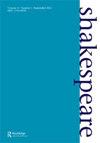Performing Babies and the Properties of Race and Ethnicity
IF 0.2
3区 文学
0 LITERATURE, BRITISH ISLES
引用次数: 0
Abstract
ABSTRACT This essay explores how props that play babies perform not just individual characters but also racial and ethnic identities in two plays by Shakespeare and one by contemporary playwright David Ireland. Working across early modern and modern archives of text and performance to track ongoing, transhistorical processes of race-making, the article argues that the stage baby’s mingling of the symbolic and material puts racial formation on display. Each play locates their baby-prop’s performance of identity at the intersection of race and gender by featuring a paternal figure searching for evidence of a kinship with a newborn. The hypervisibility of Aaron’s son’s race in Titus Andronicus, and its connections to theatre history and material culture in performance and editing choices, contrasts with baby Perdita’s relatively unspecific whiteness in The Winter’s Tale that materialises Leontes’s fears of the baby’s indistinct, potential ‘strangeness’. Ireland’s Cyprus Avenue enacts Leontes’s infanticidal threats and paranoia in the twenty-first century, staging the violent consequences of a grandfather’s obsession with British purity. The repertorial relationships between baby-props across these three plays demonstrate how patriarchal questions of filial descent intertwine with constructions of race, ethnicity, and nationality, and how studying performance practices helps reveal social processes of identity formation.表演婴儿与种族和民族的特性
摘要本文探讨了在莎士比亚的两部戏剧和当代剧作家大卫·爱尔兰的一部戏剧中,扮演婴儿的道具不仅表现了个人角色,还表现了种族和民族身份。这篇文章通过对早期现代和现代文本和表演档案的研究,追踪正在进行的、跨历史的种族制造过程,认为舞台婴儿将象征性和材料融合在一起,展示了种族的形成。每部剧都将婴儿道具的身份表现定位在种族和性别的交叉点上,以一个寻找与新生儿亲属关系证据的父亲形象为主角。《提图斯·安德罗尼科斯》中亚伦儿子种族的高度可见性,以及在表演和剪辑选择上与戏剧历史和物质文化的联系,与《冬天的故事》中婴儿佩蒂塔相对不具体的白人形成了鲜明对比,后者实现了莱昂特斯对婴儿模糊、潜在的“陌生感”的恐惧。爱尔兰的塞浦路斯大道再现了莱昂特斯在21世纪的杀婴威胁和偏执狂,上演了一位祖父痴迷于英国纯洁性的暴力后果。这三部剧中婴儿道具之间的剧目关系展示了孝顺血统的父权制问题如何与种族、民族和国籍的建构交织在一起,以及研究表演实践如何有助于揭示身份形成的社会过程。
本文章由计算机程序翻译,如有差异,请以英文原文为准。
求助全文
约1分钟内获得全文
求助全文
来源期刊

Shakespeare
Multiple-
CiteScore
0.30
自引率
33.30%
发文量
37
期刊介绍:
Shakespeare is a major peer-reviewed journal, publishing articles drawn from the best of current international scholarship on the most recent developments in Shakespearean criticism. Its principal aim is to bridge the gap between the disciplines of Shakespeare in Performance Studies and Shakespeare in English Literature and Language. The journal builds on the existing aim of the British Shakespeare Association, to exploit the synergies between academics and performers of Shakespeare.
 求助内容:
求助内容: 应助结果提醒方式:
应助结果提醒方式:


